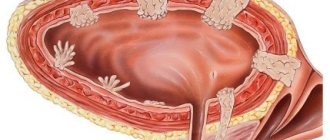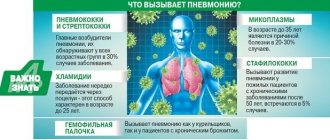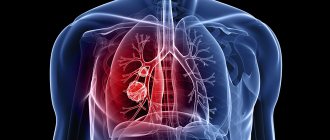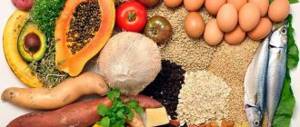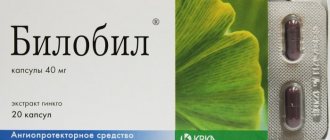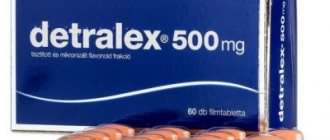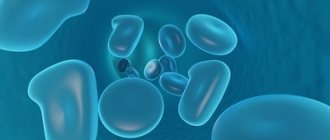The desire to increase the shelf life of food, the addition of preservatives and artificial colors, stabilizers and flavor enhancers negatively affect human health. These trends overshadow the importance of genetic predisposition to tumor development and place diet on a par with other influential factors. These include the environment, smoking and other habits related to our daily behavior. It can be said that cancer is very much a lifestyle disease. At least the statistics do not refute these conclusions. This means that the diet of cancer patients can affect the course of treatment.
How food affects cancer development
This may seem strange to some, but diet for cancer is often of great importance, helping to stabilize the patient’s condition. However, this is not surprising: food products are processed by the body into simpler components, from which new cells then appear. Nutrition for hormone-dependent cancer requires close attention, since excess weight is a risk factor for breast cancer.
One of the basic principles of a healthy lifestyle is a proper diet, which improves the antitumor properties of the immune system, normalizes weight and corrects hormonal levels.
In Asia, the cancers that plague the West—breast, colorectal, or prostate cancer—are 7 to 60 times less common. In contrast, among the Japanese who settled in the West, the incidence of cancer catches up with ours within one or two generations. Something in our lifestyle prevents the body from effectively defending itself against cancer.
Features of the diet based on the stage of the disease
It is easiest to balance the menu at an early stage of cancer, before chemotherapy has begun. In this case, it is enough to eat more natural foods, eliminate salty, fatty and fried foods. The diet should be aimed at reducing the likelihood of obesity. If at this stage the patient begins to gain weight, then it will be much more difficult for him.
Oncological tumors cause various metabolic disorders. The most vulnerable metabolic processes:
- protein;
- energy;
- carbohydrate.
Most often, by stage 3-4 of the disease, intensive treatment begins, due to which the patient’s nutritional status changes dramatically. The patient experiences protein depletion, psychogenic anorexia, changes in taste and nausea. During the course of therapy, change foods to energy-dense ones. These include eggs, sprats, red caviar, creams, cream, nuts, chocolate, honey. It is recommended to use some of them between main meals.
meals.
Nutrition or heredity - what is more important?
We live surrounded by myths that hinder our ability to kill cancer. For example, we are often convinced that cancer is primarily a problem of heredity, not lifestyle. In reality, everything is not so simple. If cancer were passed on primarily genetically, then adopted children would have cancer rates similar to those of their biological parents, not the same as those adopted. In Denmark, where there is a detailed genetic registry that tracks the ancestry of every person in the country, researchers have found the biological parents of more than 1,000 children adopted at birth. Their conclusion, published in the New England Journal of Medicine, forces us to completely change our point of view on cancer: inheriting the genes of biological parents who died of cancer before the age of 50 had no effect on the risk of developing cancer in a child. At the same time, if an adoptive parent (who does not pass on genes but shapes life habits in their children) dies of cancer, the likelihood that the adopted child will die of cancer increases five times.
This study shows that it is often lifestyle, not genes, that is the main reason for cancer susceptibility. The results of all studies are consistent: genes contribute to a maximum of 15% of cancer mortality. As you can see, there is no fatality, and we can protect ourselves from cancer.
To date, there are no alternative approaches to cancer treatment. It is impossible to cure cancer without resorting to complex methods with proven effectiveness: surgery, chemotherapy, radiation therapy, immunotherapy, hormone therapy, targeted therapy. Gradually, scientists and doctors are beginning to turn to gene therapy for cancer. Over time, it will become available to all patients. Perhaps this will be a fundamentally new page in the history of the fight against oncology.
Still, you shouldn’t limit yourself to conventional approaches. We have the power to complement the treatment by consuming healthy foods that activate our body’s natural defenses.
Features of nutrition after surgery for lung cancer
After surgical interventions, patients may experience a sharp decrease in body weight, which can lead to relapse or infection of the body with infectious diseases. To avoid these negative consequences, you should eat foods rich in protein. The number of meals varies from 6 to 8 times a day.
If vomiting or nausea occurs as a result of the breakdown of toxic substances, you can include ginger, potatoes or rice in your daily diet.
Doctors pay special attention to the amount of fluid intake. With insufficient drinking regimen, the patient may experience migraine attacks, nausea, and dizziness. The minimum quantity is 5 glasses per day.
Nutrition for breast cancer stages 1, 2, 3
The diet for breast cancer does not have to be strict. Moreover, doctors note that a sudden change in diet can lead to negative consequences. However, certain restrictions will have to be observed, because the success of treatment for hormone-dependent oncology depends on nutrition, among other things.
What to eat during and after chemotherapy
Nutrition during chemotherapy should help a woman’s body cope with the side effects of the procedures. Patients are often concerned about intestinal problems - constipation or diarrhea. In both cases, you need to drink enough liquid. For constipation, water and foods rich in fiber - grain bread, fruits, bran - promote normal peristalsis. If the patient is bothered by diarrhea, drinking frequently helps avoid dehydration.
If chemotherapy drugs make you feel nauseous, eat small meals several times a day. Berries and fruits with a sour taste also dull nausea. Many patients note that they feel more comfortable eating cool foods during chemotherapy.
Nutrition after chemotherapy is aimed at restoring the body. Doctors usually don’t single out any prohibited foods, so eat your favorite foods little by little, noting your body’s reaction to them. A positive attitude is important for recovery, and delicious meals will help with this.
The diet for breast cancer can be Mediterranean. It consists mainly of cereals, pasta, whole grain bread, as well as vegetables and fruits. Give preference to fish and seafood rather than meat. Research shows that breast cancer is quite rare in Mediterranean countries. Cook in vegetable oil. Eat dairy products within reasonable limits.
Nutrition during hormone therapy for cancer is also not limited to clear recommendations. The oncologist will always tell you what not to eat during treatment, especially when the patient has contraindications or if the medications used cannot be used simultaneously with certain foods.
How to eat with breast cancer: basic recommendations
By gradually changing your daily menu, you can slow down the development of cancer or reduce the risk of relapse of the disease. We tell you how to adjust your diet:
- Stop frying food: when cooked, foods containing carbohydrates release acrylamide, a carcinogen. To preserve the beneficial properties of food, you can cook in a double boiler.
- Avoid canned goods and foods with long expiration dates. If it’s difficult, remove them from your diet gradually. Someday you will be surprised that it took you so long to give up this food.
- Drink green tea, which is known for its antioxidant properties. Beetroot works in a similar way, so it will also be beneficial for cancer patients.
- Try to replace sweets with honey, dark chocolate, marshmallows and dried apricots.
- Monitor the nutritional value of your food. Nutrition for breast cancer should include fats, a third of which are of plant origin, and protein, which is found in beef, low-fat cottage cheese, and sea fish. Gradual weight loss while being overweight will indicate that you are going in the right direction.
- Include broccoli in your diet. Cabbage from the cruciferous family is most beneficial for humans and has antitumor activity.
- It is almost impossible to achieve the daily dose of nutrients from regular food. It’s hard to imagine that you can eat, for example, 4 kg of cabbage per day. To compensate for the deficiency of substances useful for oncology, take special products that include indole-3-carbinol (cruciferous plant extract) and epigallocatechin-3-gallate (green tea extract). They are contained in a standardized quantity in the biologically active food supplement Promisan. Today, this is perhaps the only food supplement with clinically proven effectiveness and recommended for patients with oncology to reduce the risk of relapse of breast, ovarian, and endometrial cancer. More than 6,000 publications in authoritative international sources are devoted to the oncoprotective effect of indole-3-carbinol and epigallocatechin-3-gallate. Find out more at promisan.ru.
similar on topic
Cancer protection: what women need to know about indole-3-carbinol
READ MORE
Nutrition for breast cancer can be tasty and varied. Remember that a strict diet will not bring benefits, and do not forget to check with your doctor about what you can eat based on your condition. Change your lifestyle, starting with small steps. Do everything with pleasure, let every day of your new life give rise to a new cell!
List of sources:
- Muranova O. Yu. Risk factors for breast cancer // Siberian Journal of Oncology. 2007. pp. 76-77.
- Karpova T.V., Lytova S.F. Culinary food carcinogens // Science, technology and education. 2020.
- Gorbunova N.V., Evteev A.V., Bannikova A.V., Reshetnik E.I. Prospects for using products of complex processing of crop production as sources of antioxidants // Far Eastern Agrarian Bulletin. 2020. No. 2(42). pp. 120-126.
- Chochieva A. R., Bolieva L. Z. Study of the chemopreventive activity of broccoli powder on the occurrence of mammary tumors induced in rats by MNM // Bulletin of new medical technologies. 2010. No. 3. P. 172-173.
PHOTOS: unsplash.com
Share
Products that must be consumed
During lung cancer, the mucous membrane is affected, which leads to disruption of the fundamental function of the body - metabolism. Therefore, nutrition for lung cancer should be moderately high in calories and saturated with proteins, fats and carbohydrates in equal measure.
Experienced nutritionists adhere to the rule that in case of lung cancer, meals must be fractional. The human body should receive daily:
- dietary meat (chicken, turkey, rabbit);
- vegetables and fruits in unlimited quantities;
- drinking purified water.
Features of food selection
| Authorized Products | Impact |
| Walnuts | They have antioxidant properties and contain phytosterols and melatonin. |
| Seaweed | Contains laminarin and fucoidan, which prevent the growth of cancer cells. |
| Turmeric | Disables genes responsible for the growth of cancer cells; prevents the growth of blood vessels for cancerous tumors. |
| Soybeans | Contains isoflavonoids, which reduce the risk of hormone-dependent types of lung cancer. |
| Salmon and trout | A significant amount of omega-3 inhibits growth, causing the death of cancer cells. |
| Tomatoes | Contains the pigment lycopene - inhibits the process of cell mutation. |
| Green tea | Contains catechins that stop the development and absorption of healthy cells by cancer. |
Recommendations from nutritionists
Products of dairy and plant origin should predominate in the diet.
It is necessary to eat as soon as the desire appears , since the body needs a lot of energy and strength to fight the disease.
Caviar, seafood, and red fish are useful for patients. They contain fats that are needed by a weakened body and will help improve well-being.
1-2 hours before the administration of chemotherapy, liquids and food should not be taken . Cancer patients often experience dehydration. To prevent it, you should drink at least 1.5 liters of water per day.
Preventing relapses with medications
Prevention of cancer (primary or recurrent) with drugs is called “chemoprevention”. Doctors noted that taking certain medications used for other reasons can protect against the development of cancer. These observations reflect the statistics of large numbers; individual fate may turn out differently, but the chances of avoiding the disease increase. So…
Acetylsalicylic acid. Many years ago, doctors noticed the properties of acetylsalicylic acid to delay the development of colon cancer. Since then, numerous studies have been introduced to support this effect. For other types of cancer, acetylsalicylic acid can also be useful - prostate cancer, lung cancer, ovarian cancer, esophageal cancer and some others. Therefore, when doctors are hesitant whether to give a patient aspirin to prevent heart disease or not (there are pros and cons), a family history of cancer, for example, of the colon, may sway the doctor's opinion in favor of aspirin.
Metformin. Active ingredient in several first-line drugs for the treatment of type 2 diabetes. It has the unique effect of reducing the resistance of our receptors to the action of insulin. It is also used to treat infertility, polycystic ovary syndrome, metabolic syndrome and to lose excess weight. Strictly speaking, diabetes is a precancerous condition: insulin resistance underlies not only diabetes and heart disease, but also many types of oncology.
Statins are cholesterol-lowering drugs. These drugs may reduce the risk of ovarian, esophageal, and colon cancer. There is no exact explanation for this fact yet, and I don’t want to bore you with hypotheses. The situation here is the same as with aspirin - at the moment the scales swing: whether to take it or not - the presence of risk factors for oncology can make the choice easier.
Medicines used to prevent breast cancer. If we reduce the logic of their prescription to a primitive level, it will sound like this: increased levels of estrogen can lead to breast cancer, so drugs that reduce the sensitivity of tissue to estrogen can have a preventive effect in terms of oncology.
Enteral and parenteral nutrition for adults
Enteral nutrition refers to the insertion of a special probe into the esophagus and stomach, through which specialized nutritional mixtures are introduced into the patient’s body.
Parenteral nutrition is the introduction of high-calorie solutions into the bloodstream. Most often it is a glucose solution.
Prescribed for the purpose of preventing nutritional disorders that develop when independent nutrition is impossible.
They adhere to the principle of adequacy, which implies full coverage of the body’s energy needs and a balance in the composition of substances used for nutrition.
What is nutritional support for cancer patients?
Proper nutrition is the key to the harmonious functioning of the body.
Oncological diseases very strongly and quickly deplete all established processes.
Metabolism is disrupted, which is associated with the tumor’s active consumption of glucose, vitamin elements, and proteins, which are normally required for building the structural components of the body, and the resulting toxic products are actively released into the systemic bloodstream.
If bleeding occurs, this can be manifested by a disruption in the supply of oxygen to tissue structures, a change in the condition of the tissue, which significantly complicates the course of an already difficult process.
The nutritional goals of cancer patients are:
- reducing the level of intoxication in the body and in the area where the tumor is located;
- normalization and support of liver function;
- stimulation of metabolism and regeneration of cellular structures;
- an increase in hemoglobin levels and an improvement in oxygen exchange occurring between red blood cells and pathologically unchanged cells;
- normalization of the biochemical composition of blood;
- maintaining homeostasis.
Oncology is a terrible diagnosis, unfortunately there is no 100% insurance against it, and many people perceive such a doctor’s verdict as the final life sentence.
However, this is far from true; the most important factor is the stage of diagnosis of the pathology.
It is possible, and definitely necessary, to fight, or rather to wage a real “war” against a malignant tumor, the main thing is not to give up. Of course, this is a task of extreme complexity (an undeniable fact), but we repeat that it is absolutely impossible to stop fighting cancer; you must strictly follow the oncologist’s instructions, believe and hope.
The development of the oncological process begins with the appearance of one abnormal (“wrong”) cell. The body is protected from everything foreign by the immune system, but under certain conditions a malfunction occurs and the cell mutates into a cancerous one.
A similar term refers to an abnormal accumulation of intercellular substance, or a group of cells that do not obey orders (regulation) from the body.
Fundamentally, the nature of the tumor is classified:
- Benign - a growing mass of “foreign” cells remains within the area of origin, there is no germination into surrounding tissues, there are no metastases (foci of cancer in distant organs). The increase in the size of such a neoplasm occurs slowly, without any noticeable negative health effects. The exception is situations where surrounding organs and tissues are compressed by a growing tumor mass;
- Malignant - clusters of cancer cells, growing, penetrate (grow) into neighboring tissues. Through the blood they reach distant areas (metastasize).
The term “cancer” itself is applicable to malignant neoplasms that arise from the cellular mass of epithelial tissues. Other types of tissue can also serve as a catalyst for the onset of a malignant tumor, but they will be called differently; three groups of formations are distinguished:
- Carcinoma is the predominant (more than 90%) form of malignant formation, emerging from tissues located at the border of internal and external environments. Such shells take the initial blow of the carcinogenic effect;
- Sarcoma - cancer of connective tissues (skeletal bones, fat layer, muscle), maximum 5% of cases;
- The remaining forms of cancer, born in the “depths” of highly specialized tissue cells, account for a total of 2-3% of tumors (meningiomas, lymphomas, melanomas).
Nutritional support was developed by Arvid Wretlind. He also described the basic principles
1. Timeliness. Nutritional support for cancer patients should begin as early as possible, even before the development of various nutritional disorders. Untimely nutritional support may not lead to proper results and may not prevent the development of protein-energy malnutrition, followed by cachexia.2.
Optimality. Nutritional support for cancer patients should be provided for a long time, until the body’s weight, tests and digestive functions are completely restored. Therapy can be completed only after ensuring that the patient’s clinical nutrition has been fully restored. Canceling artificial nutrition early will not be effective and will not lead to proper results.
3. Adequacy. Artificial nutrition must meet the body's energy needs and be balanced in its nutrient composition. If the diet is not balanced, the body will not receive enough of the elements it needs. Or, on the contrary, you will receive more of them than you need.
When preparing artificial nutrition, it is necessary to correctly assess the patient’s energy needs. Energy needs are assessed using special formulas. The simplest of them is an indicator of the average energy requirement of a cancer patient.
EOO (men) = 66 (13.7xMW) (5xP) - (6.8xB)EOO (women) = 655 (9.6xMW) (1.8xP) - (4.7xB) where EOO is basal metabolic rate (kcal) MT - body weight (kg) P - height (cm) B - age (years).
In stressful situations, the intensity of energy consumption changes, and depending on the patient’s condition, the daily energy requirement can presumably be as follows:
- After planned abdominal operations - 30-40 kcal/kg.
- After radical surgery for cancer - 50-60 kcal/kg.
- For severe mechanical skeletal injuries - 50-70 kcal/kg.
- For traumatic brain injuries - 60-80 kcal/kg.



